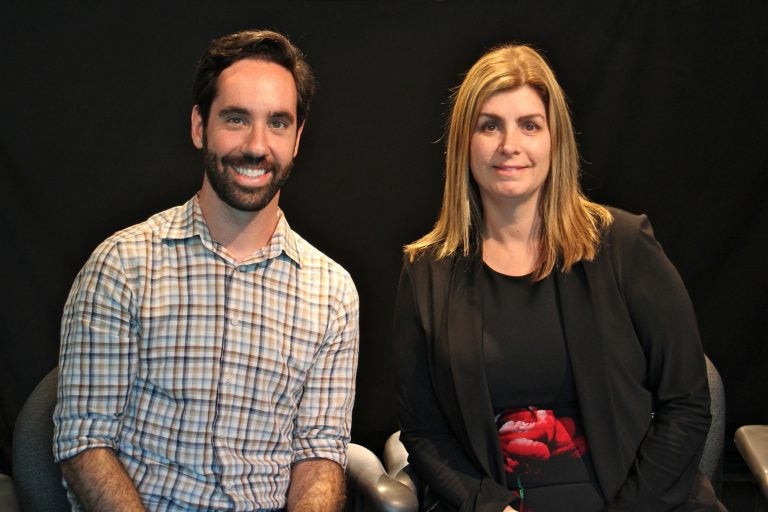Teen brains require many z’s, for many reasons
Some middle and high schools in the area are starting their school days later, which experts say will result in healthier, less troublemaking students.
Listen 6:42
Daniel Semenza, an assistant professor at the Department of Sociology, Anthropology, and Criminal Justice at Rutgers, and Ilene M. Rosen, Associate Professor of Medicine at the University of Pennsylvania and a past president of the American Academy of Sleep Medicine. (Emma Lee/WHYY)
Classes start Tuesday for many students in the region. And some in middle and high schools will be sleeping in, thanks to new start times in a handful of districts.
The change is based on national recommendations that teens begin the school day no earlier than 8:30 a.m., to allow for more rest.
That’s vital for good mental and physical health. And it can keep young people out of trouble, according to Ilene Rosen, Associate Professor of Medicine at the University of Pennsylvania and a past president of the American Academy of Sleep Medicine, and Dan Semenza, a Rutgers University-Camden researcher who looks at connections between health and crime.
Morning Edition host Jennifer Lynn spoke with Rosen and Semenza about teens’ unique need for sleep.
—
Ilene Rosen: So, circadian rhythms are our internal clock and it is what dictates how alert or how sleepy we feel during any point of the day, separate from how much sleep we are getting. Teens need more sleep than the average adult, even though they’re considered young adults in many ways. They need about 8 ½ to 10 hours of sleep. Their internal clocks are actually what we call “delayed.” It’s hard for them to go to sleep or unwind much before 10:30 or 10:45 at night. And then, on top of that, they have plenty of things that stimulate them to make it even harder for them to go to bed. And then, subsequently, they don’t feel like they naturally want to wake up much before 7 to 8 o’clock.
Why are these sleep needs for teens so different?
IR: So, sleep needs change across the lifespan. By the time someone is a full-fledged adult in their early to mid 20s, they need the recommended eight or so hours of sleep. But teens, their brains are still forming. There is pruning of neurons in the brain until about the early 20s, and so increased sleep during that age is not really surprising when you know that there’s still brain development happening.
It’s so interesting. And you’re both proponents of having teens have an opportunity to sleep in a bit, is that right?
IR: Yes.
Dan Semenza: That’s right.
And, obviously, there are these two big recommendations: Centers for Disease Control and Prevention, also the American Academy of Pediatrics saying, you know, middle school and high schools shouldn’t really start before, say, 8:30, to give students more time to sleep. And it can maintain good physical, psychological health, and one hopes it could lead to academic achievement. Is there anything else?
IR: There’s interest right now in several long-term consequences of sleep loss. One is mental health, or some of the mental health issues both acutely in high school and colleges related to lack of sleep, or a pattern of lack of sleep, even further along in adulthood. What does sleep in childhood or teenage years do for your mental health? I think that’s under question a lot. Additionally, sleep deprivation has been associated with cardiac disease over the long term, increased risk of heart attacks. Also, now there’s a lot of focus on something called “neuroplasticity.” So, the idea about how neurons in the brain are adjusting over time, and is there any risk to dementia when you alter that ability for neuroplasticity?
OK, and Dan, you and others have been researching another benefit: More sleep can mean fewer behavioral troubles, fewer legal troubles. Tell us about this criminal justice perspective.
DS: Well, we’ve been kind of building off this idea that there are a lot of benefits to more sleep. And since there’s been a lot of good research on connecting better sleep with better impulse control, better self-control, less irritability, we are starting to draw these connections that if teenagers have more sleep, if that school time is delayed, you could potentially see a reduction in some delinquent behaviors.
OK, so walk us through this research to look at greater self-control when you have more sleep. How do you determine that that is better when you’re getting more sleep?
DS: Kind of just put it in everyday terms: When you feel well rested, and you feel like you had the sleep that you need, you’re less irritable. If something bothers you or upsets you, you might be able to react in a less aggressive way, or not bite back at somebody who might have annoyed you or bugged you in some way. And, but teenagers especially, we could see that that kind of irritability could really cause problems for aggression. Small things like getting in trouble, and detention at school, but potentially larger things outside of school where the teen is actually getting into, you know, fights, or making poor decisions about stealing or vandalism, all different kinds of behaviors.
Ilene, what interferes the most with teens getting enough sleep?
IR: The amount of electronics that they have available to them. Not only are what’s going on in social media and on their electronics themselves interesting to them and keeps them engaged, but also the blue light that they emit from the devices are actually stimulating in someone whose circadian rhythm, or clock, is not necessarily ready to go to bed. Stimulation with blue light is like going out in the middle of the day when you wanted to take a nap and getting some sunlight and you feel more awake. And then the other area is, because of this chronic sleep deprivation, and a lot of the ways students are booked after school, they are coming home and taking a nap, then getting up and saving all their work until later in the night. And, so, they just are having a hard time adjusting to their day, because of the fact that their circadian alignment, their clocks are mismatched with their school day.
What’s your sense about naps?
IR: We always say that the best countermeasure for sleep is sleep. Strategic napping is certainly OK if you allow an hour for a nap and you allow yourself 15 to 20 minutes to fall asleep, and then you set an alarm for 30 or 40 minutes later. Even have some caffeine before you fall asleep, which is different than most people think about doing it.
I heard that, yeah.
IR: And then when you wake up at the end, people won’t feel kind of so hung over or dragging after a nap. That does count towards that minimum eight- to 10-hour limit.
Say students are adjusting to this new schedule, they get a little extra sleep, hopefully they’re utilizing that extra time for sleep, and then the weekend comes and it goes out the window.
IR: The idea that just delaying school start times will equal more sleep, it’s a step in the right direction along with understanding from the teachers, the parents in particular, the students themselves. This is only one piece of the puzzle, changing school start times.
WHYY is your source for fact-based, in-depth journalism and information. As a nonprofit organization, we rely on financial support from readers like you. Please give today.





